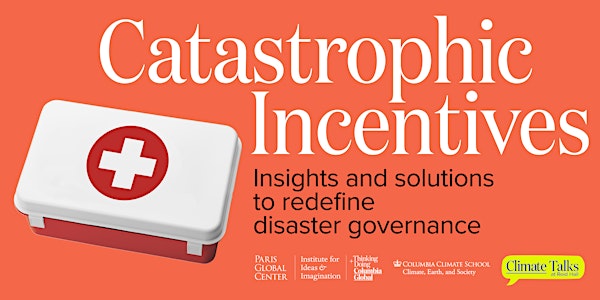This event will be held in English.
Co-organized by the Columbia Global Paris Center and Columbia Climate School. With the support of the Institute for Ideas and Imagination.
To be notified of our upcoming events, we invite you to sign up for our twice monthly newsletter.
—
Offering a comprehensive and incisive look at disaster governance, Catastrophic Incentives provides timely recommendations for reimagining systems and institutions so that they are better equipped to manage twenty-first-century threats. Join authors Jeff Schlegelmilch and Ellen Carlin for a discussion about their newly-released book, followed by a discussion with the audience.
The book
Catastrophic Incentives (Columbia University Press, 2024) reveals troubling patterns about what does and does not matter to the institutions that are responsible for dealing with disasters. The short-termism of electoral politics and corporate decision making, the funding structure of nonprofits, and the institutional dynamics shaping academic research have all contributed to a failure to build resilience.
Examining twenty years of disasters from 9/11 to COVID-19, Jeff Schlegelmilch and Ellen Carlin show how flawed incentive structures make the world more vulnerable when catastrophe strikes. They explore how governments, the private sector, nonprofits, and academia behave before, during, and after crises, arguing that standard operational and business models have produced dysfunction.
Societies are vulnerable to any number of potential disasters: earthquakes, hurricanes, infectious diseases, terrorist attacks, and many others. Even though the dangers are often clear, there is a persistent pattern of inadequate preparation and a failure to learn from experience. Before disasters, institutions pay insufficient attention to risk; in the aftermath, even when the lack of preparation led to a flawed response, the focus shifts to patching holes instead of addressing the underlying problems.
Speakers
Jeff Schlegelmilch is a research scholar and the director of the National Center for Disaster Preparedness at the Columbia Climate School at Columbia University. His areas of expertise include public health preparedness, community resilience and the integration of private and public sector capabilities. Jeff serves in advisory roles for public, private, and nonprofit organizations on issues related to disaster resilience. Previously, he was an epidemiologist and emergency planner for the Boston Public Health Commission. Jeff is also the author of Rethinking Readiness: A Brief Guide to Twenty-First-Century Megadisasters (Columbia, 2020).
Ellen Carlin is a veterinarian and policy expert specializing in emerging infectious disease prevention and preparedness. She undertakes scientific study and policy development to address infectious pathogens, particularly those that can be transmitted between animals and humans. She has worked on national security challenges and disaster preparedness across sectors, including as senior professional staff with the U.S. House of Representatives and founding staff member of the Bipartisan Commission on Biodefense. Previously a faculty member at Georgetown University and Cornell University, Ellen now owns Parapet Science & Policy Consulting. Through her firm she supports the implementation of infectious disease research projects in the United States and abroad, assisting clients involved in preparedness and response efforts.
Organizers
The Columbia Global Paris Center addresses pressing global issues that are at the forefront of international education and research: agency and gender; climate and the environment; critical dialogues for just societies; encounters in the arts; and health and medical science.
The Columbia Climate School's mission is to develop and inspire knowledge-based solutions and educate future leaders for just and prosperous societies on a healthy planet.
Each year the Institute for Ideas and Imagination brings together a cohort of 14-15 Fellows, half of them Columbia faculty and post-docs, the other half artists and writers from around the world, to spend a year together in work and conversation. The Institute fosters intellectual and creative diversity unconstrained by medium and discipline through the interaction of the arts and academia.
Columbia Global brings together major global initiatives from across the university to advance knowledge and foster global engagement. Those initiatives include the Columbia Global Centers, Columbia World Projects, the Committee on Global Thought, and the Institute for Ideas and Imagination. Our mission is to address complex global challenges through groundbreaking scholarly pursuits, leadership development, cutting-edge research, and projects that aim for social impact. Our long-term goal is to reimagine the university’s role in society as not only a nexus for learning and intellectual exploration but also as a catalyst for creativity and impact locally, regionally, and globally.
Venue
Nestled in the Montparnasse district, Reid Hall hosts several Columbia University initiatives: the Columbia Global Paris Center, the Institute for Ideas and Imagination, Columbia Undergraduate Programs, M.A. in History and Literature, and the GSAPP Shape of Two Cities Program. This unique combination of resources is enhanced by our global network whose mission is to expand the University's engagement the world over through educational programs, research initiatives, regional partnerships, and public events.
The views and opinions expressed by speakers and guests do not necessarily reflect the official policies or positions of the Columbia Global Paris Center or its affiliates.
